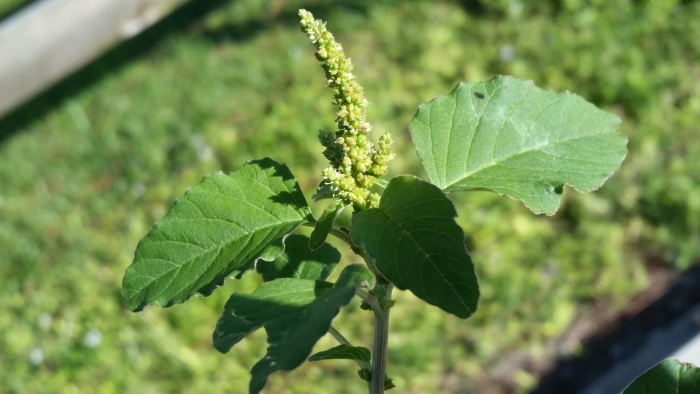Purple Amaranth
(Amaranthus blitum)
Purple Amaranth (Amaranthus blitum)
/
/

© Jay Horn
CC BY 4.0
Image By:
© Jay Horn
Recorded By:
Copyright:
CC BY 4.0
Copyright Notice:
Photo by: © Jay Horn | License Type: CC BY 4.0 | License URL: http://creativecommons.org/licenses/by/4.0/ | Uploader: jayhorn | Publisher: iNaturalist |

























Estimated Native Range
Summary
Amaranthus blitum, commonly known as Purple Amaranth or Guernsey Pigweed, is an annual herb native to South America. It can grow up to 3.3 feet tall and is characterized by its green to purplish ovate leaves and small, clustered flowers that are typically green but can have a reddish tint. The flowers bloom from summer to early fall and are less showy compared to other ornamental species. This plant is often found in warm, temperate areas and is adapted to a range of soil types, though it prefers nitrogen-rich soils.
Purple Amaranth is valued for its edible leaves and seeds, which are used in a variety of culinary traditions. It is also cultivated as a leafy vegetable in some regions and can be a colorful addition to ornamental gardens due to its foliage. In cultivation, it requires minimal care, thriving in full sun to part shade and tolerating a wide range of soil conditions, though it prefers well-drained soils. It is drought-tolerant once established and can be a useful plant for xeriscaping. However, it can become weedy and invasive outside its native range, so gardeners should be cautious and check local regulations before planting.CC BY-SA 4.0
Purple Amaranth is valued for its edible leaves and seeds, which are used in a variety of culinary traditions. It is also cultivated as a leafy vegetable in some regions and can be a colorful addition to ornamental gardens due to its foliage. In cultivation, it requires minimal care, thriving in full sun to part shade and tolerating a wide range of soil conditions, though it prefers well-drained soils. It is drought-tolerant once established and can be a useful plant for xeriscaping. However, it can become weedy and invasive outside its native range, so gardeners should be cautious and check local regulations before planting.CC BY-SA 4.0
Plant Description
- Plant Type: Herb
- Height: 0.25-1.2 feet
- Width: 1-1.25 feet
- Growth Rate: Rapid
- Flower Color: Green, Red, White
- Flowering Season: Spring, Summer, Fall
- Leaf Retention:
Growth Requirements
- Sun: Full Sun
- Water: Medium
- Drainage: Fast, Medium, Slow
Common Uses
Edible*Disclaimer: Easyscape's listed plant edibility is for informational use. Always verify the safety and proper identification of any plant before consumption., Low Maintenance
Natural Habitat
Disturbed sites, vegetable gardens, and agricultural lands
Other Names
Common Names: Purple Amaranth, Least Amaranth, Livid Amaranth
Scientific Names: , Amaranthus blitum, Albersia arenaria, Albersia ascendens, Albersia blitum, Albersia blitum var. oleraceus, Albersia livida, Albersia oleracea, Albersia oleracea, Albersia viridis
GBIF Accepted Name: